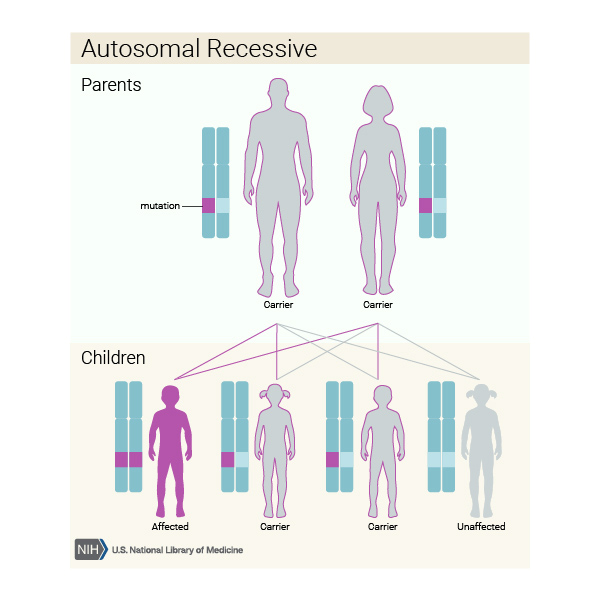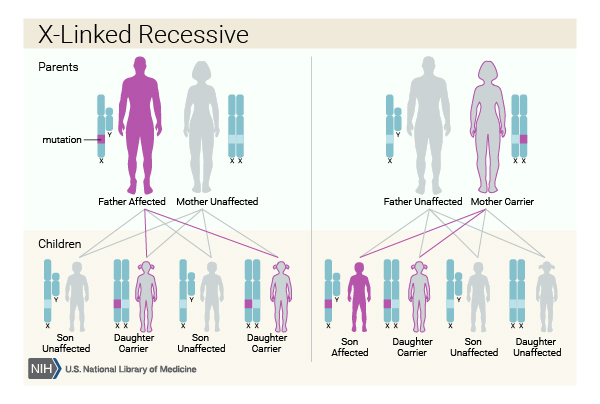What is Carrier Screening?
Many people think they do not need carrier screening before or during a pregnancy because they do not have any genetic conditions in their family and/or because they have healthy children. This is simply not true – read below to get the facts to determine if carrier screening is right for you and your family.
Carrier screening can also be referred to as expanded carrier screening, preconception genetic testing, Inheritest®, Foresight®, Horizon™, or UNITY Complete.
Why can’t my family history tell me about all genetic risks to a future child?
Family history cannot predict all possible health risks to a child is because some genetic conditions can be passed down silently through families. This means that there may be no sign of the condition in the family, and no other family member who is affected with the condition. An individual can carry a genetic change in their blood but have mild or even no symptoms of the condition. That person can pass on this genetic change to their child, which may cause the child to be affected, depending on what the child inherits from their other biological parent.
Additionally, family history does not provide the full story because some genetic conditions are not passed down by blood. Instead, some genetic conditions occur by chance due to an error in the egg or sperm. Down syndrome is an example of a condition that often happens by chance at the time an embryo is forming. For this reason, testing for Down syndrome is usually available once there is a pregnancy or embryo to test. If you have a family history of a chromosome condition or if you and your partner have had 2 or more pregnancy losses together, speak with a genetic counselor about whether you and/or your partner should have chromosome testing performed (called a karyotype test).
It’s also important to understand that some medical conditions are caused by environment or lifestyle factors, such as diet or tobacco use. Other conditions, like diabetes or mental health conditions, are caused by a combination of genetic and non-genetic factors.
How do you know if you “carry” a genetic condition?
A test called “carrier screening” can be performed to screen you and your reproductive partner’s DNA for certain, not all, genetic conditions. Carrier screening can be performed on a blood or saliva sample at any time before or during a pregnancy.
What does carrier screening test for?
Carrier screening can test for a few genetic conditions or hundreds of genetic conditions (all on the same test) that people can “silently” carry (this is also referred to as expanded carrier screening). Most carriers have no symptoms of the condition; however, their children may be at-risk to develop the condition. The symptoms of these genetic conditions can range from mild to very serious, but typically the symptoms start in infancy or childhood. Symptoms may include learning disabilities, physical differences, medical issues such as seizures, vision or hearing loss, and/or a shortened life expectancy. Some of the genetic conditions included on carrier screening are treatable while others are not, and some may cause a serious effect on a child’s quality of life.
Carrier screening typically tests for conditions inherited in an autosomal recessive or X-linked recessive pattern.
What is autosomal recessive inheritance?
Typically, each person has two copies of most genes, which are like instruction manuals for how our bodies grow and work. For some conditions, called autosomal recessive conditions, a person needs two copies of a gene that doesn’t work correctly in order to have the condition. If someone only has one copy of the gene that doesn’t work correctly, they are called a ‘carrier.’ Carriers usually don’t have any symptoms, but they can pass that gene on to their children. If both members of a reproductive pair are carriers for the same autosomal recessive condition, with each pregnancy, there’s a 1 in 4 chance (25%) their child could inherit two copies of the gene that doesn’t work correctly and, therefore, have the condition. Examples of autosomal recessive conditions are cystic fibrosis (CF) or spinal muscular atrophy (SMA).

What is X-linked recessive inheritance?
X-linked recessive conditions are passed down through genes on the X chromosome. Males, who typically only have one X chromosome, will have the condition if they have one copy of the affected gene. Females, who typically have two X chromosomes, need two copies of the affected gene to have the condition. If a female only has only one copy of the affected gene, they are referred to as a “carrier”. Carrier females have a 50% chance of passing the affected gene to each son, who will then have the condition if they inherit this affected gene. An example of an X-linked recessive condition is Duchenne muscular dystrophy.

Who should be offered carrier screening?
The American College of Obstetricians & Gynecologists (ACOG) recommend that all people who are thinking about getting pregnant or who are currently pregnant be offered carrier screening for cystic fibrosis, hemoglobinopathies, and spinal muscular atrophy. The National Society of Genetic Counselors (NSGC) recommend that all people considering pregnancy and all pregnant reproductive pairs be offered expanded carrier screening. Check with your healthcare provider about which conditions they recommend or offer carrier screening for. If you have questions about carrier screening that cannot be answered by your provider, schedule a virtual genetic counseling appointment with Allay Life today.
How common is it to be a carrier of genetic condition?
This depends on a number of factors, including your family history and ethnicity. Even without a family history of any specific genetic condition, the chance to be a carrier of any specific genetic condition can range from less than 1% to up to 10%. Of people who have expanded carrier screening for about 175 genetic conditions, 2 out of 5 people (60%) are found to be a carrier of at least one condition. The chance of being a carrier for the same condition as your reproductive partner is about a 1 in 22 chance (4.5%) based on published research. This chance is higher if you share a common ancestor (for example, if you and your reproductive partner are cousins) or if you and your partner undergo carrier screening for more than 175 conditions.
Some people think that prenatal ultrasound will detect a pregnancy affected with a genetic condition so carrier screening is not needed.
Not all genetic conditions included on carrier screening can be detected by prenatal ultrasound (in fact, many would go undetected). Ultrasound is good at detecting major birth defects in a fetus, which are structural changes that can affect almost any part of the body (heart, brain, kidneys). Many genetic conditions are not associated with major birth defects. Other genetic conditions can cause symptoms that can only be detected after birth or in childhood, such as learning disabilities.
Will insurance cover carrier screening? How much does carrier screening cost?
Most insurance companies cover the majority of the cost of carrier screening but check with your specific insurance provider. If insurance does not cover this test, carrier screening typically costs $250 or less. Most labs that perform carrier screening will offer financial aid to people who qualify, so ask your healthcare provider or the company performing the carrier screening test about this option.
How do I decide if carrier screening is right for me or my partner?
Carrier screening is an optional test. It is important to consider your own values and beliefs, including how you may use the information you learn from carrier screening.
If you choose to have carrier screening before pregnancy and learn about an increased risk to have a future child affected with a genetic condition:
- Some people may decide not to have biological children if they learn they are at a higher chance to have an affected child.
- Others may choose to use a sperm, egg, or embryo donor to reduce the chance of having an affected child.
- Another option that can be considered is adoption or foster parenting.
- Other people may consider in vitro fertilization (IVF) with genetic testing on embryos (called PGT-M). This can reduce the chance of having a child affected with a genetic condition.
If you choose to have carrier screening during pregnancy and learn about an increased risk for a current pregnancy to be affected with a genetic condition:
- Some people would consider prenatal diagnostic testing (CVS or amniocentesis) to confirm whether or not the fetus is affected with the genetic condition before delivery, while others would use the results to help guide confirmatory genetic testing on a baby after delivery.
- If the pregnancy was found to be affected based on prenatal diagnostic testing, some may consider pregnancy termination while others would use this information to prepare for the birth of a child with a genetic condition.
- Genetic test results may also impact where a person receives medical care during a pregnancy, which types of doctors are involved in their pregnancy care, and where they deliver their baby.
It’s normal to feel some degree of anxiety or worry as you think about the option of carrier screening. Some people find it helpful to discuss this decision further with a trusted person, a healthcare provider, or a genetic counselor.
If I have carrier screening before pregnancy, do I need genetic testing during pregnancy?
The simple answer is yes, if you desire additional information about your baby’s health. Genetic testing during pregnancy provides different information than you can receive prior to pregnancy. You do not need to repeat carrier screening during pregnancy. However, ACOG recommends that all pregnant people be offered prenatal screening and diagnostic testing for chromosome conditions, such as Down syndrome.
If you have questions about carrier screening that cannot be answered by your provider, schedule a virtual genetic counseling appointment with Allay Life today.






